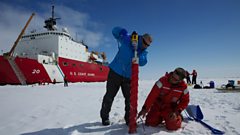Making Waves
A US news agency finds fishermen held as slaves in Southeast Asia.
We hear how hundreds of men from Myanmar and other South-East Asian countries are being used as slaves to catch fish that end up on American dinner tables. Then, we find out why Americans are being urged to be better informed about the seafood they eat.
Also, we witness a scientist unlocking one of the great mysteries of Arctic ice melt. Japanese artists remember the Fukushima disaster through their photography. And we learn about the ‘Texas Miracle’ that’s fuelling huge economic growth— and the climate change that may end it. Plus, how musicians in the Nile River basin are helping their region tackle its drought problem.
(Photo: Thai and Burmese fishing boat workers sit behind bars inside a cell at the compound of a fishing company in Benjina, Indonesia. Credit: AP Photo/Dita Alangkara)
Last on
Clips
-
![]()
Fukushima in Pictures
Duration: 03:33
-
![]()
A Eureka Moment in the Arctic
Duration: 04:25
-
![]()
Houston’s Climate Change Conundrum
Duration: 04:51
Chapters
-
Slaves at Sea
How men from South-East Asia are being used as slaves to catch fish that end up in the US
Duration: 03:14
Ethical Eating
A few expert tips for choosing and eating seafood responsibly
Duration: 03:29
Eureka Moment
A scientist unlocks one of the mysteries of Arctic ice melt
Duration: 05:16
‘In The Wake’
A new exhibit at the Museum of Fine Arts in Boston puts Fukushima in perspective
Duration: 04:19
Houston’s Problem
The 'Texas miracle' fuelling economic growth - and the climate change that may end it
Duration: 05:11
The Nile Project
Tackling the Nile River’s drought problem, one song at a time
Duration: 03:36
Broadcasts
- Sat 4 Apr 2015 04:32GMTÂ鶹ԼÅÄ World Service Online
- Sat 4 Apr 2015 13:32GMTÂ鶹ԼÅÄ World Service Online
- Sat 4 Apr 2015 19:32GMTÂ鶹ԼÅÄ World Service Online
Free Download
Subscribe to receive every episode automatically
Boston Calling Clips
Big stories, short listens - highlights from Boston Calling
Podcast
-
![]()
Boston Calling
How the world looks through American eyes, and the myriad and unexpected ways that the world influences the United States.





